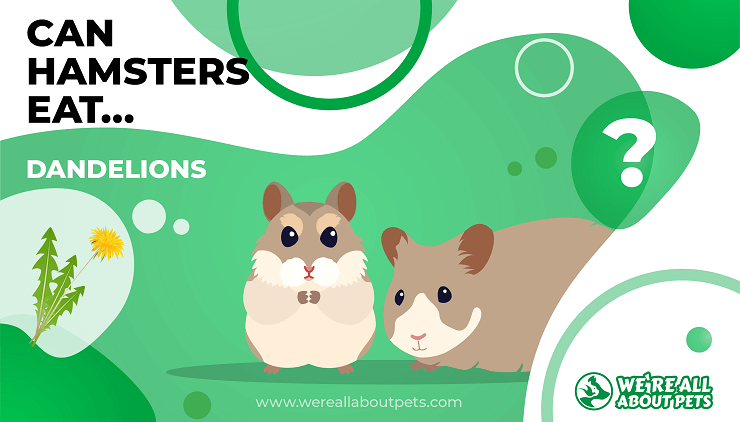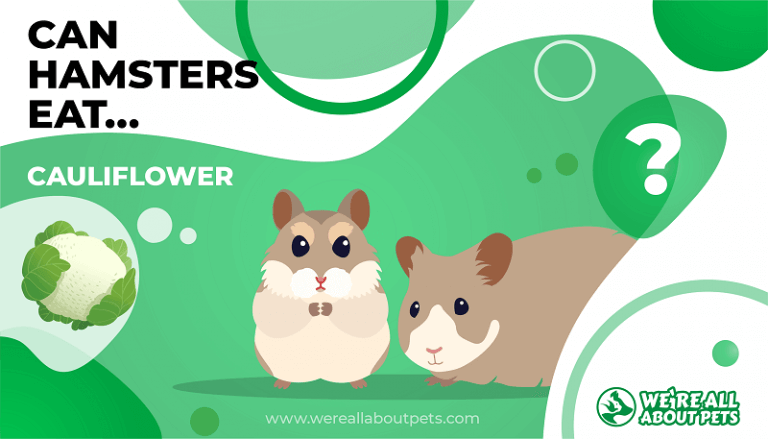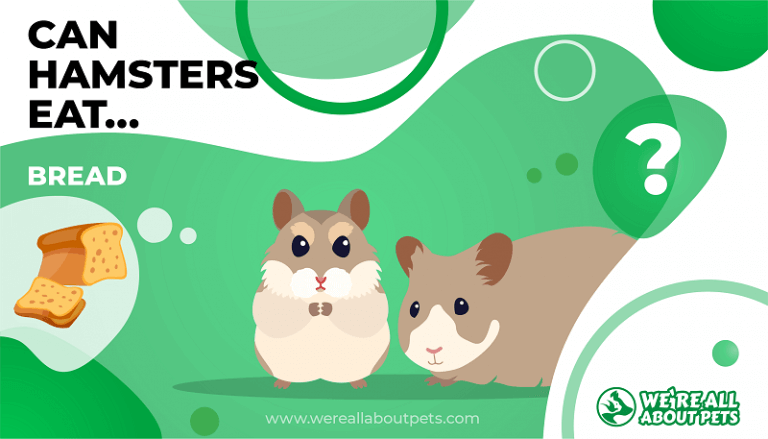Can Hamsters Eat Cucumber?
This page contains affiliate links. We may earn money or products from the companies mentioned in this post through our independently chosen links, which earn us a commission. Learn More
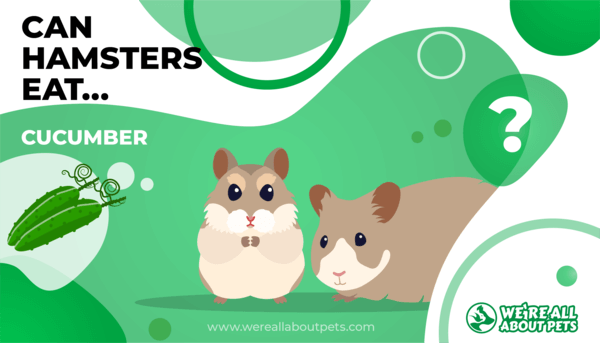
Cucumbers make a nice addition to salad – and lots of animals like to eat them, too!
Here’s the question of the moment: Can you give a hamster cucumber? If so, how much cucumber can your hammy have? Is there such a thing as too much cucumber?
The quick answer is “Yes!” Hamsters can have cucumber. It’s important to give your pet the right amount and follow some easy rules for proper preparation, so keep reading.
We’ve put together a complete guide with all the answers to your questions about cucumbers for hamsters.
Cucumber Nutrition Stats
If you’ve ever been on the lookout for healthy snacks, you’ve probably chosen cucumber. After all, it’s crunchy, hydrating, and low in calories – and it tastes pretty good, too!
A one-cup serving of fresh cucumber slices has about:
- 15 calories
- 8 g carbohydrates
- .6 g fiber
- .6 g protein
- .2 g fat
Cucumber Nutritional Facts
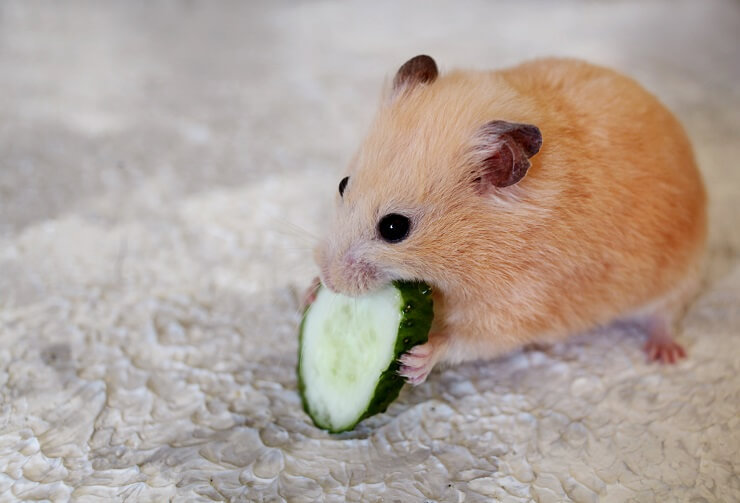
Cucumbers might not be the most nutritious veggies on the planet but they do have some vitamins and minerals that make them a good choice.
In that same one-cup serving of sliced cucumber, you get approximately:
- 17 mcg vitamin K
- 3 mg vitamin C
- .1 mg vitamin B6
- 6 mg magnesium
- 13 mg potassium
Make sure you leave the skin on your cucumber if you want to enjoy all of these nutrients – it contains far more than the center and the seeds.
Can Hamsters Have Cucumber?
Yes – and you’ll want to take a photo of your hammy nibbling on a cucumber slice as soon as you get the chance! It’s super cute.
Is Cucumber Good For Hamsters?
Since hamsters do best on diets that include plenty of variety but not a lot of sugar, the answer is yes! Cucumber is one of the best natural treats for hamsters.
Do Hamsters Like Cucumber?
While there might be a few hammies who don’t really care for the taste of cucumber, most hamsters enjoy the crunchy texture and mild flavor that cucumbers provide.
How Much Cucumber Can A Hamster Eat?
Cucumber is one of those rare treats you can offer in abundance.
Here’s how much cucumber to feed a hamster:
| Age | Amount |
| Baby hamster | None |
| Adult hamster | 1 or 2 slices |
Give a hamster a slice of cucumber and you’re likely to see lots of happy nibbling!
Be sure to cut your hamster’s cucumber slices to a size that will be comfortable for them to pick up and nibble. If the cucumber slice is too large, it will be difficult to eat.
Besides the size of the cucumber slice, consider your hamster’s general diet when deciding how much to offer. New foods – particularly very watery ones like cucumber – can disrupt your hamster’s digestion and cause diarrhea.
This means taking a careful approach and gradually introducing this yummy snack to your hammy over time.
If your hamster already eats fresh foods, you might want to start with one thin slice. If your hamster hasn’t ever eaten fresh fruit or veggies, then offer about ¼ slice of cucumber to start with.
In both cases, watch for signs of diarrhea over the next 12 hours or so. If you don’t notice anything out of the ordinary, you can give your hamster a little more next time and gradually work your way up to an entire hamster-sized serving of cucumber.
How Often Can A Hamster Eat Cucumber?
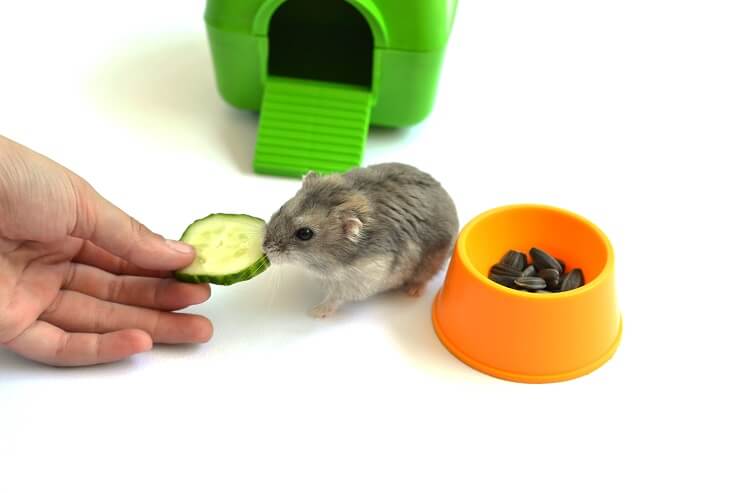
Since it’s important to mix things up and provide your hamster with plenty of variety, it’s probably best to offer cucumber no more than a few times per week. In very hot weather when you’re trying to help your pet stay hydrated, you might want to let them have a little bit of cucumber every day.
There’s just a little more to think about before you head for the kitchen in search of cucumber for your hamster:
- If you’ve had your pet for a while and they already eat fresh veggies, it’s OK to offer them a little bit of cucumber as often as once per day, keeping the importance of variety in mind and providing other healthy treats at the same time.
- If your hamster is a new addition to your pet family, then they might never have had fresh treats! Since a sudden change in diet can make your hamster sick, take a careful, gradual approach and give your hamster cucumber slices no more often than every other day for at least a week.
- Be sure to start with a really tiny amount – maybe a quarter of a slice – and don’t provide other fresh foods at the same time until your hamster’s digestive system has had at least a week to adjust. If you notice diarrhea, stop providing fresh food for a couple of days and then gradually restart.
The Correct Diet Is Important
While hamster pellets are designed to be nutritionally complete and it’s perfectly fine to feed your hamster nothing but a diet of pellets, it’s likely that your pet will be far happier with a varied, interesting diet.
Here’s why: A hamster’s natural diet is full of different foods including grass, leafy plants, veggies, perhaps a few nibbles of fruit here and there, and animal-based protein including crickets and worms.
Be sure to check the package your hamster’s pellets are in to determine the correct serving size.
Besides their daily serving of pellets, here’s what else to feed your hamster:
- Unlimited amount of fresh Timothy hay for nibbling, tunneling, and nesting
- Unlimited amount of fresh water; rinse and refill your hamster’s drinking every day
- Occasional protein snacks: Dried mealworms are a very popular option and hamsters usually love them
- Birdseed – no more than about a teaspoon per week
- Little bits of fresh fruit and vegetables once a day or every other day
- Chewable treats to keep your hamster’s teeth from becoming overgrown: Coconut shell, hay cubes, unbleached loofah, and untreated softwood are top options
Since hamsters instinctively stash food away for later, give them only as much fresh food as they can consume right away. Remove any uneaten produce to prevent your hamster from hoarding it; this prevents spoilage and mold.
What Are Other Healthy Alternatives To Cucumber In A Hamster’s Diet?
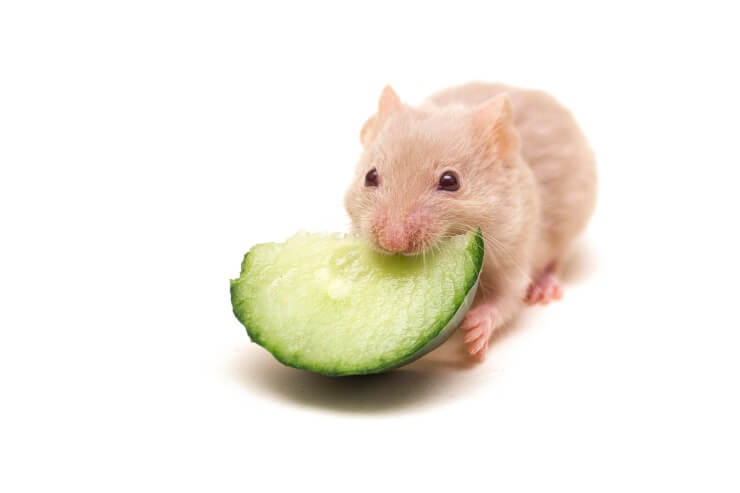
Cucumbers are a favorite with hamsters but there are all sorts of other veggies they enjoy!
Here’s a short list of some top hamster-approved vegetables:
- spinach
- buttercrunch lettuce
- red lettuce
- escarole
- bibb lettuce
- green beans
- winter squash
- bell pepper
- pumpkin
- celery
- summer squash
- parsnip
- broccoli
- broccolini
- zucchini
- sweet potato
- tomato
- okra
- cauliflower
- watercress
- yu choy
- bok choy
- baby corn
- artichoke
- sweet corn
- basil
- cabbage
- asparagus
- parsley
- mint
- cilantro
- carrot
- carrot tops
- romaine
- beets
- beet tops
- potato (cooked only)
- arugula
- sprouts
- rocket
- swiss chard
- endive
The odds are fairly good that if you like a certain fruit or vegetable, it’s OK to share some with your hamster.
At the same time, there are some common foods that are toxic to hamsters. This means it’s really important to conduct just a few minutes of research whenever you feel like offering your hamster a new, different treat.
For now, giving your hamster cucumber is a great way to make their diet more exciting and get some adorable photos while you’re at it!
Frequently Asked Questions
Is cucumber safe for hamsters?
Yes! It’s safe to give a hamster cucumber. Just remember to wash it well and peel it if there’s wax on the skin. Also, remember to slice it into a manageable size.
Can cucumber make my hamster sick?
Cucumber can give your hamster diarrhea if they eat too much at once, particularly when they aren’t yet accustomed to eating fresh foods. Take a very slow, gradual approach to introducing cucumber (and other new foods!) to your hamster’s diet and the risk of illness should be minimal.






